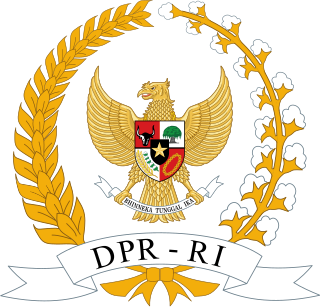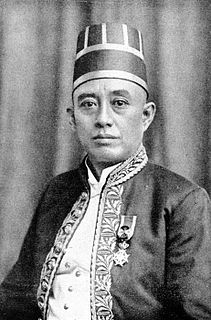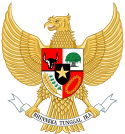
The South African Republic, often referred to as the Transvaal or as the Transvaal Republic, was an independent and internationally recognised country in Southern Africa from 1852 to 1902. The country defeated the British in what is often referred to as the First Boer War and remained independent until the end of the Second Boer War on 31 May 1902, when it was forced to surrender to the British. After the war the territory of the ZAR became the Transvaal Colony.

Netherlands New Guinea refers to the Papua region of Indonesia while it was an overseas territory of the Kingdom of the Netherlands from 1949 to 1962. Until 1949 it was a part of the Dutch East Indies. It was commonly known as Dutch New Guinea. It contained what are now Indonesia's two easternmost provinces, Papua and West Papua, which were administered as a single province prior to 2003 under the name Irian Jaya.

Batavia, also called Betawi in the city's local Malay vernacular, was the capital of the Dutch East Indies. The area corresponds to present-day Jakarta. Batavia can refer to the city proper, as well as its suburbs and hinterland, the Ommelanden, which included the much larger area of the Residency of Batavia in today's Indonesian provinces of DKI Jakarta, Banten and West Java. In Betawi Malay, the area constituting the former Residency of Batavia is called Tanah Betawi.

The People's Representative Council, alternatively translatable as the House of Representatives or as the House of People's Representatives, is one of two elected national legislative assemblies in Indonesia.

Franciscus Georgius Josephus van Lith, SJ or often called Frans van Lith or affectionately Romo van Lith, born 17 May 1863 - died 9 January 1926; was a Jesuit priest from Oirschot, Netherlands who pioneered the Catholic mission in Java, especially Central Java.
Jacobus Groenendaal was a South African statesman of Dutch origin, member of the Volksraad of the Orange Free State and the republic's first Treasurer General and Government Secretary in office from 1854 to 1855 and 1856 respectively.

Pangeran Adipati Soejono was a Dutch politician and the only Indonesian minister who has ever seated in a Dutch cabinet meeting.

Frederik Hermanus "Dick" de Hoog was the Indo (Eurasian) President of the Indo European Alliance, member of People’s Council and professional politician in the Dutch East Indies. He was also a Grand Master (Masonic) of the Dutch East Indies Freemasonry.

Elections to the Volksraad were held in the Dutch East Indies on 16 October 1917. The result was a victory for the Dutch Indies Freethinkers Association, who defeated the Protestant Christian Ethical Party and the Catholic Indian Catholic Party.

Elections to the Volksraad were held in the Dutch East Indies in 1921. The result was a victory for the Political Economic Union.

Elections to the Volksraad were held in the Dutch East Indies in 1924.

Elections to the Volksraad were held in the Dutch East Indies in 1927.

Elections to the Volksraad were held in the Dutch East Indies in 1931.

The Governor-General of the Dutch East Indies represented Dutch rule in the Dutch East Indies between 1610 and Dutch recognition of the independence of Indonesia in 1949.
Mohammad Husni Thamrin was an Indonesian political thinker and National Hero.
The Indo people or Indos are Eurasian people living in or connected with Indonesia. In its narrowest sense, the term refers to people in the former Dutch East Indies who held European legal status but who were of mixed descent, that are descendants of various indigenous peoples of Indonesia and Dutch settlers. In the broadest sense, an Indo is anyone of mixed European and Indonesian descent. Indos are associated with colonial culture of the former Dutch East Indies, a Dutch colony in Southeast Asia and a predecessor to modern Indonesia after its proclamation of independence shortly after World War II. The term was used to describe people acknowledged to be of mixed Dutch and Indonesian descent, or it was a term used in the Dutch East Indies to apply to Europeans who had partial Asian ancestry. The European ancestry of these people was predominantly Dutch, but also included Portuguese, British, French, Belgian, German, and others.

Kandjeng Pangeran Aria Adipati Achmad Djajadiningrat was a prominent colonial Indonesian bureaucrat who served as Regent of Serang (1901-1924), and subsequently of Batavia (1924-1929). He was also a member of the Volksraad of the Dutch East Indies.
The Denpasar Conference was held from 7 - 24 December 1946 at the Hotel Bali and resulted in the establishment of the State of East Indonesia, part of the United States of Indonesia. It was at this conference that the Dutch government stated its position that control of Western New Guinea would not be handed over at the same time as the rest of the Dutch East Indies.












